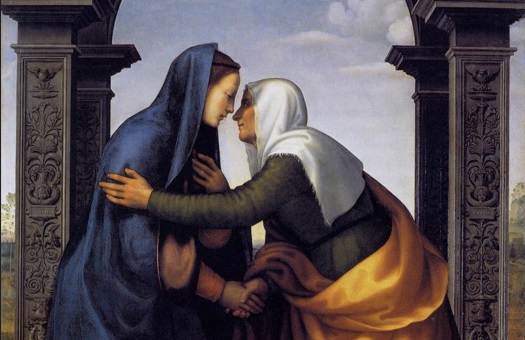
A PERFECT SAINT

Last week, a relatively young friend of mine died after a long battle with cancer. As his close friends, my wife, Christine and I were asked to offer words of reflection at his memorial service. As Christine spoke of her friend, she was careful to point out that our task in such moments is not to canonize a person but celebrate who they were in their entirety. She graciously offered that in our Catholic tradition, “each of us is put on this planet to bring a unique cocktail of gifts to the universe. A saint is someone who makes the very best effort to do that.”
As I listened, I paused to consider exactly what we mean when we speak of Saints. We consider in our everyday conversations that “So-and-so was no saint” or even “So-and-so is a perfect saint” or “I’m no saint.” It is in these words that we find an underlying understanding that sainthood is dependent on flawless perfection. If the lives of the saints teach us anything, it is that there is no such thing as a perfect saint. Each person declared a saint in the Church, and even saintly people who have never been formally declared as such, were and are human beings. Their sainthood was, and is, determined by their ability to live out their lives transcending human weakness and challenge. They were, and are, subject to all the foibles of the human condition. To be declared a saint is not an elevation to divinity. Only God is perfect.
We only need to look at the lives of some saints to see this. St. Paul oversaw the murder and persecution of Christians prior to his conversion to a life of fervent evangelization in Christ’s name. St. Augustine’s Confessions share with us the imperfect life of a man on a perfect journey to faith and witness. St. Teresa of Calcutta garners criticism for her honest doubt, and her political tenacity as she lived her God-given call to bring Christ’s love and care to the world’s most destitute persons. The list goes on… In short, saints are not so much perfect people, as people who found the perfect opportunities to make their lives bigger than themselves. Amid their imperfect attempts, their lives pointed beyond themselves, and left legacies of faithful service and action that inspire others for generations. It is through them, not necessary because of them, that God is building a better world. Such an understanding of saintliness is much needed in our current culture which seems to demand that any persons in the public gaze have lived unblemished lives.
On this Feast of All Saints, let us bear this in mind. We don’t have to be perfect to be saints, and saints do not have to be perfect to be honoured. We are part of the communion of saints by virtue of our Baptism. It is God’s grace that enables us, and the Saints we honour, to rise above our human frailty and use our cocktail of gifts to do our part to build the reign of God on earth. We all fall short of the glory of God. What Saints show us is that if we strive toward that Divine Glory, we can go beyond our limitations and sins and do our part to make our world more reflective of God’s reign, and closer to the Communion of Saints in God’s heavenly realm.
And so we pray:
God of all glory,
Send us your Grace
That we may live to seek your glory,
At home,
At work,
In our churches,
And in all our daily encounters.
As we seek your Glory,
May we be reflections,
However imperfect,
Of your perfection,
To those who seek comfort and justice.
You alone, O Lord, are Perfect.
May the examples of the Saints,
Inspire us to seek Your Perfection
And live lives worthy
Of our calling
To be your saintly people.
We ask this through the intercession
of the Blessed Virgin Mary, first among Saints,
and All Saints who have sought and shared You,
And through You Son, Jesus.
Amen.
Michael Way Skinner is a retired Coordinator of Religion, Family Life, and Equity with the York Catholic District School Board. He received a Bachelor of Arts in Philosophy (1st Class Honours) degree from St. Francis Xavier University and a Master of Divinity from Harvard Divinity School. He also completed the Program in Religion and Secondary Education (P.R.S.E.) with the Harvard Graduate School of Education. Michael was a contributing author to World Religions: A Canadian Catholic Perspective, and co-authored There Must be a Pony in Here Somewhere with his wife, Christine Way Skinner. Michael is a public speaker and award-winning educator who is deeply committed to faith as a source for inclusion and justice.
